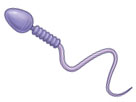Our Health Library information does not replace the advice of a doctor. Please be advised that this information is made available to assist our patients to learn more about their health. Our providers may not see and/or treat all topics found herein. A testosterone test checks the level of this male hormone (androgen) in the blood. Testosterone affects sexual features and development. In men, it is made in large amounts by the testicles. In both men and women, testosterone is made in small amounts by the adrenal glands, and in women, by the ovaries. The pituitary gland controls the level of testosterone in the body. When the testosterone level is low, the pituitary gland releases a hormone called luteinizing hormone (LH). This hormone tells the testicles to make more testosterone. Before puberty, the testosterone level in boys is normally low. Testosterone increases during puberty. This causes boys to develop a deeper voice, get bigger muscles, make sperm, and get facial and body hair. The level of testosterone starts to decline around age 40, then gradually becomes less in older men. In women, the ovaries account for half of the testosterone in the body. Women have a much smaller amount of testosterone in their bodies compared to men. But testosterone plays an important role throughout the body in both men and women. It affects the brain, bone and muscle mass, fat distribution, the vascular system, energy levels, genital tissues, and sexual functioning. Most of the testosterone in the blood is bound to a protein called sex hormone binding globulin (SHBG). Testosterone that is not bound ("free" testosterone) may be checked if a man or a woman is having sexual problems. Free testosterone also may be tested for a person who has a condition that can change SHBG levels, such as hyperthyroidism or some types of kidney diseases. Total testosterone levels vary throughout the day. They are usually highest in the morning and lowest in the evening. A testosterone test may be done to: In general, there's nothing you have to do before this test, unless your doctor tells you to. Your doctor may want you to do a morning blood test. That's because testosterone levels are highest between 7 a.m. and 9 a.m. A health professional uses a needle to take a blood sample, usually from the arm. When a blood sample is taken, you may feel nothing at all from the needle. Or you might feel a quick sting or pinch. There is very little chance of having a problem from this test. When a blood sample is taken, a small bruise may form at the site. Your doctor will have your test results in a few days. Each lab has a different range for what's normal. Your lab report should show the range that your lab uses for each test. The normal range is just a guide. Your doctor will also look at your results based on your age, health, and other factors. A value that isn't in the normal range may still be normal for you. Current as of: July 7, 2025 Author: Ignite Healthwise, LLC Staff Current as of: July 7, 2025 Author: Ignite Healthwise, LLC Staff Clinical Review Board This information does not replace the advice of a doctor. Ignite Healthwise, LLC disclaims any warranty or liability for your use of this information. Your use of this information means that you agree to the Terms of Use and Privacy Policy. Learn how we develop our content. To learn more about Ignite Healthwise, LLC, visit webmdignite.com. © 2024-2026 Ignite Healthwise, LLC.Testosterone Test
Why It Is Done
How To Prepare
How It Is Done
How It Feels
Risks
Results
Normal
High values
Low values
Related Information
Credits
Clinical Review Board
All Ignite Healthwise, LLC education is reviewed by a team that includes physicians, nurses, advanced practitioners, registered dieticians, and other healthcare professionals.
All Ignite Healthwise, LLC education is reviewed by a team that includes physicians, nurses, advanced practitioners, registered dieticians, and other healthcare professionals.
Our Health Library information does not replace the advice of a doctor. Please be advised that this information is made available to assist our patients to learn more about their health. Our providers may not see and/or treat all topics found herein. Current as of: July 7, 2025 Author: Ignite Healthwise, LLC Staff Clinical Review BoardTestosterone Test
All Ignite Healthwise, LLC education is reviewed by a team that includes physicians, nurses, advanced practitioners, registered dieticians, and other healthcare professionals.








